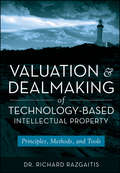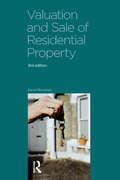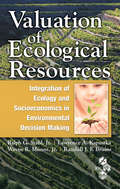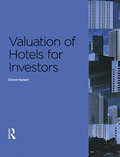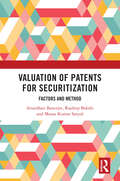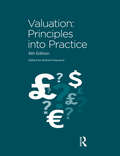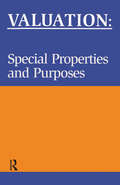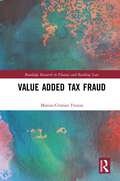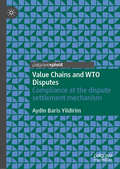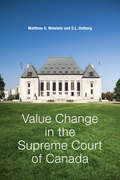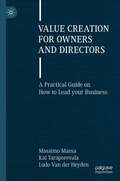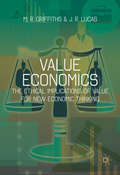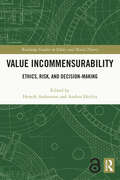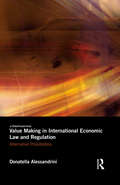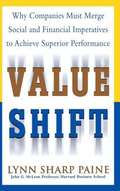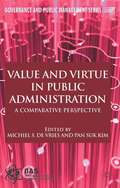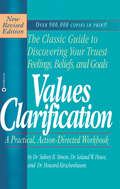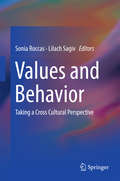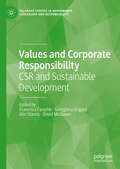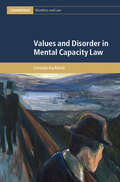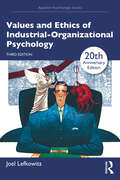- Table View
- List View
Valor: The American Odyssey of Roy Dominguez
by Rogelio "Roy" DominguezThe son of Hispanic immigrants, Rogelio "Roy" Dominguez grew up in gang-plagued Gary, Indiana. With strong family support, he managed to beat the odds, graduating with distinction from Indiana University, finishing law school after a rough start, and maturing into a successful attorney and officeholder. Yet there was more in store for Roy. Ready to start a family and embark on a career as a deputy prosecutor, he was stricken with Guillain-Barré syndrome. How he coped with and eventually overcame this debilitating affliction is a compelling part of his story. The experience steeled him to meet future crises with wisdom, perspective, and grit. An inspiring true story, Valor is also a significant and original contribution to the social, ethnic, and political history of Indiana.
Valuation and Dealmaking of Technology-Based Intellectual Property
by Richard RazgaitisThis indispensable tool provides readers with complete coverage of the issues, methods, and art of valuing and pricing of early-stage technologies including backgrounds in the core concepts, sources of value, methods of valuation, equity realizations, and negotiation strategies.
Valuation and Sale of Residential Property
by David MackminValuation and Sale of Residential Property is aimed at all those studying for a qualification or already practising as residential valuers, surveyors and estate agents. It provides valuable information on all elements of the home sales process, enabling professionals to give advice on market value, the best means for sale, condition and financial arrangements. Topics covered include: determinants of value and provision of the valuation agency, auction and taking instructions mortgage valuation and survey legal process and types of tenure investment and return. The author considers these topics against a background of wide legislative change and draws on the standard guidelines set down by the RICS and NAEA. This third edition, written at a time of rapid change in the home-selling market, details the processes and procedures for dealing with this ever-evolving market. Whatever your level of seniority, this book will help you stay ahead of the game and present sound advice to clients at any stage of the process.
Valuation of Ecological Resources: Integration of Ecology and Socioeconomics in Environmental Decision Making
by Lawrence A. Kapustka Wayne R. Munns Jr. Randall J. Bruins Ralph G. Stahl Jr.Choosing the optimal management option requires environmental risk managers and decision makers to evaluate diverse, and not always congruent, needs and interests of multiple stakeholders. Understanding the trade-offs of different options as well as their legal, economic, scientific, and technological implications is critical to performing accurate
Valuation of Hotels for Investors
by David HarperThis book provides detailed, up-to-date knowledge that will help property professionals become successful in the hotel market. The book includes a range of valuation practices and shows the reader the most effective way to read, manage and work their way through this highly competitive market. The author focuses on current methodology and practice within the hotel market, the market trends and legalities which will change or amplify those practices, and further sets out property investment options with real examples.
Valuation of Patents for Securitization: Factors and Method
by Manas Kumar Sanyal Arundhati Banerjee Rajdeep BakshiIntellectual property rights and assets have become a major contributor to market capitalization for different companies. This book discusses the processes of valuation of patents and the legal and regulatory concerns around patent securitization.Patents are used as an instrument of securitization to attract funds towards supporting further research and monetisation which opens-up new areas of research. They are utilised through means such as licensing, sale and purchase, financing and others. This book provides an in-depth look into the importance of patents and more importantly their securitization. It analyses the patent securitization applications as well as existing methods towards gauging the suitability of patents. The authors explore simple yet suitable methods for the valuation of patents that can be applied to the existing models to arrive at a pragmatic value. The book also includes studies and tests these systems for their reliability and application in different research areas and companies.This book will be of interest to practitioners involved in financing and monetisation of patents, academics, researchers and students working in patent valuation, financial management, economics international economics.
Valuation: Principles into Practice
by R. E. H. HaywardThe sixth edition of Valuation: Principles into Practice continues to be both a core text for all students undertaking surveying qualifications and a handy reference guide for valuers in practice. The new edition has been thoroughly updated with nine completely re-written chapters. The book provides extensive details of valuation principles and practices in agricultural, commercial, residential, industrial and leisure sectors. The balance of academic and practicing contributors explore the law and regulation within the field of valuation and include chapters on valuations for financial investments, taxation and rating insurance, as well as useful case studies and detailed approaches to valuation procedures for a variety of properties from farms to public houses. With extensive market knowledge and the obvious benefit of his involvement with the five previous editions, Richard Hayward brings the sixth edition well into the twenty-first century. The book continues it’s tried and tested melding of ‘town and gown’, and the twenty six contributors to the twenty three chapters are all leading specialists in their fields.
Valuation: Special Properties And Purposes
by Phil Askham Leslie BlakeEach topic treated represents an area of specialism in its own right. This book helps fill the gap between the extremes of neglect and detailed consideration in existing texts by providing an authoritative and yet accessible treatment of several complex and technical subjects. Each chapter has been written by an acknowledged expert in the field with extensive practical experience, and where appropriate is supported by comprehensive case studies and worked examples. What this book emphatically will not do, is turn anyone into an expert in the specialist and even arcane worlds of the plant and machinery valuer or the valuation of milk quotas. What it will do, however, is give some indication of the problems and pitfalls associated with these fields.
Value Added Tax
by Victor Thuronyi Alan Schenk Victor Thuronyi Wei Cui Alan SchenkThis book integrates legal, economic, and administrative materials about the value added tax (VAT) to present the only comparative approach to the study of VAT law. The comparative presentation of this volume offers an analysis of policy issues relating to tax structure and tax base as well as insights into how cases arising out of VAT disputes have been resolved. Its principal purpose is to provide comprehensive teaching tools - laws, cases, analytical exercises, and questions drawn from the experience of countries and organizations around the world. This second edition includes new VAT-related developments in Europe, Asia, Africa, and Australia and adds new chapters on VAT avoidance and evasion and on China's VAT. Designed to illustrate, analyze, and explain the principal theoretical and operating features of value added taxes, including their adoption and implementation, this book will be an invaluable resource for tax practitioners and government officials.
Value Added Tax Fraud (Routledge Research in Finance and Banking Law)
by Marius-Cristian FrunzaServing as an introduction to one of the "hottest" topics in financial crime, the Value Added Tax (VAT) fraud, this new and original book aims to analyze and decrypt the fraud and explore multi-disciplinary avenues, thereby exposing nuances and shades that remain concealed by traditional taxation oriented researches. Quantifying the impact of the fraud on the real economy underlines the structural damages propagated by this crime in the European Union. The ‘fruadsters’ benefit when policy changes are inflicted in an economic space without a fully fledged legal framework. Geopolitical events like the creation of the Eurasian Union and 'Brexit' are analyzed from the perspective of the VAT fraud, thereby underlining the foreseeable risks of such historical turnarounds. In addition, this book also provides a unique collection of case studies that depict the main characteristics of VAT fraud. Introduction to VAT Fraud will be of interest to students at an advanced level, academics and reflective practitioners. It addresses the topics with regards to banking and finance law, international law, criminal law, taxation, accounting, and financial crime. It will be of value to researchers, academics, professionals, and students in the fields of law, financial crime, technology, accounting and taxation.
Value Chains and WTO Disputes: Compliance at the dispute settlement mechanism
by Aydin Baris YildirimAs economic populism and protectionism increasingly threatens the global trade order, this book examines the behavior of World Trade Organization (WTO) members at the judicial arm of the WTO—the dispute settlement mechanism (DSM). The author explores why and when governments cooperate at the WTO and comply with the ruling of its panels, focusing on how the growth of global value chains through the internationalization of trade and production has increased the importance of both trade liberalization and supra-national governance and policy-making. Finding that domestic organized interests—i.e. firms and sectors—mobilize and lobby national governments to change their domestic policies to better harmonize with their international trade commitments, the author outlines how the time it takes to comply with adverse WTO rulings is shorter when the potential domestic costs of non-compliance outweigh protectionist interests. The author’s innovative research design highlights the conditions under which the WTO can preserve the rules of international trade and support a more open, global economy.
Value Change in the Supreme Court of Canada
by Cynthia Ostberg Matthew WetsteinValue Change in the Supreme Court of Canada is a groundbreaking analysis of the degree to which Supreme Court decisions reflect the changing values of society over the past four decades. Focusing on three key areas of law: environmental disputes, free speech, and discrimination cases, Wetstein and Ostberg provide a revealing analysis of the language used by Supreme Court justices in landmark rulings in order to document the way that value changes are transmitted into the legal and political landscape. Bolstered by a comprehensive and nuanced blend of research methods, Value Change in the Supreme Court of Canada offers a sweeping analysis of pre- and post-Charter influences, one that will be of significant interest to political scientists, lawyers, journalists, and anyone interested in the increasingly powerful role of the Supreme Court.
Value Creation for Owners and Directors: A Practical Guide on How to Lead your Business
by Massimo Massa Kai Taraporevala Ludo Van der HeydenThis book deals with a much understudied and poorly understood aspect of business: the role of owners and boards in value creation. While there is abundant guidance on value creation for publicly listed firms and their managers, the role played by owners, and their corporate directors, in value creation and governance has been overlooked. This book aims to fill that gap. • The first part deals with the mission, and the values and rules pertaining to the governance of the business. These structural elements are fundamental for owners to get right as they pave the way to value creation, or its opposite. They refer to “WHAT” owners have to do. Another element is the formation of the three boards that govern owner-led firms: the owners board, the board of directors, and the management board. • The second part addresses the relational elements that owners must master to effectively manage the social and emotional dynamics in their enterprise. It deals with the “HOW” of ownership, namely the leadership process that lies at the heart of board work. This process ensures alignment across the three boards and also with stakeholders that is vital to realizing owners’ value creating aims. • Thirdly, the book explores the histories, defining experiences, and talents that define owners and shape their enterprise. It concerns the “WHOM,” namely the identities of owners. It explores the diversity of ownership styles and identifies the critical personal transitions owners must make in their leadership quest. This book offers a practical guide for business aiming for value creation. It also should be of interest to directors and executives of all firms with identifiable ownership, such as entrepreneurial, family, state-owned and private equity firms.
Value Economics
by M. R. Griffiths J. R. LucasThe last financial crisis revealed a gap between business practice and ethics. In Value Economics, Griffiths and Lucas examine some of the reasons for this ethical gap and discuss the resulting loss of confidence in the financial system. One of the reasons has been hazy or inadequate thinking about how we value economic enterprises. With the close link between the creation of value and business ethics in mind, this book proposes that economic value should become the basic metric for evaluating performance in the creation of value, and for establishing fair and reasonable standards for executive compensation. Value Economics considers a number of rational philosophical principles for business management, on which practical codes of business ethics can be based. As the creation of value has moral implications for economic justice, the book reaffirms the argument for economics as a moral science, and seeks, within the context of proposed changes in the regulation and control of financial services, to answer the following question: will things really change after the last financial crisis?
Value Economics: The Ethical Implications of Value for New Economic Thinking
by M. R. Griffiths J. R. LucasThe last financial crisis revealed a gap between business practice and ethics. In Value Economics, Griffiths and Lucas examine some of the reasons for this ethical gap and discuss the resulting loss of confidence in the financial system. One of the reasons has been hazy or inadequate thinking about how we value economic enterprises. With the close link between the creation of value and business ethics in mind, this book proposes that economic value should become the basic metric for evaluating performance in the creation of value, and for establishing fair and reasonable standards for executive compensation. Value Economics considers a number of rational philosophical principles for business management, on which practical codes of business ethics can be based. As the creation of value has moral implications for economic justice, the book reaffirms the argument for economics as a moral science, and seeks, within the context of proposed changes in the regulation and control of financial services, to answer the following question: will things really change after the last financial crisis?
Value Incommensurability: Ethics, Risk, and Decision-Making (Routledge Studies in Ethics and Moral Theory)
by Anders HerlitzIncommensurability is the impossibility to determine how two options relate to each other in terms of conventional comparative relations. This book features new research on incommensurability from philosophers who have shaped the field into what it is today, including John Broome, Ruth Chang and Wlodek Rabinowicz. The book covers four aspects relating to incommensurability. In the first part, the contributors synthesize research on the competing views of how to best explain incommensurability. Part II illustrates how incommensurability can help us deal with seemingly insurmountable problems in ethical theory and population ethics. The contributors address the Repugnant Conclusion, the Mere Addition Paradox and so-called Spectrum Arguments. The chapters in Part III outline and summarize problems caused by incommensurability for decision theory. Finally, Part IV tackles topics related to risk, uncertainty and incommensurability. Value Incommensurability: Ethics, Risk, and Decision-Making will be of interest to researchers and advanced students working in ethical theory, decision theory, action theory, and philosophy of economics.
Value Making in International Economic Law and Regulation: Alternative Possibilities
by Donatella AlessandriniThis book examines the contemporary production of economic value in today’s financial economies. Much of the regulatory response to the global financial crisis has been based on the assumption that curbing the speculative ‘excesses’ of the financial sphere is a necessary and sufficient condition for restoring a healthy economic system, endowed with real values, as distinct from those produced by financial markets. How, though, can the ‘intrinsic’ value of goods and services produced in the sphere of the so-called real economy be disentangled from the ‘artificial’ value engineered within the financial sphere? Examining current projects of international legal regulation, this book questions the regulation of the financial sphere insofar as its excesses are juxtaposed to some notion of economic normality. Given the problem of neatly distinguishing these domains – and so, more generally, between economy and society, and production and social reproduction – it considers the limits of our current conceptualization of value production and measurement, with specific reference to arrangements in the areas of finance, trade and labour. Drawing on a range of innovative work in the social sciences, and attentive to the spatial and temporal connections that make the global economy, as well as the racial, gender and class articulations of the social reproductive field within it, it further asks: what alternative arrangements might be able to affect, and indeed alter, the value-making processes that underlie our current international regulatory framework?
Value Shift: Why Companies Must Merge Social and Financial Imperatives to Achieve Superior Performance
by Lynn Sharp PaineThis book is about changing notions of corporate performance--what it is and how to achieve it. Although addressed principally to those who want to build high-performing companies--managers, executives, directors, entrepreneurs--its message has relevance for a much wider audience.
Value and Virtue in Public Administration: A Comparative Perspective
by Michiel S. De Vries Pan Suk KimA multidisciplinary analysis of the role of values and virtue in public administration, this book calls for a rediscovery of virtue. It explores ways of enabling the public sector to balance the values that are presently dominant with classic values such as accountability, representation, equality, neutrality, transparency and the public interest.
Values Clarification: A Practical, Action-Directed Workbook
by Howard Kirschenbaum Sidney B. Simon Leland W HoweAre you getting what you want out of life? Do you know where you draw the line when it comes to sex, money, cheating on your income tax ... or accepting an indecent proposal? Becoming aware of your values is the key to making wise choices in all aspects of your life, from picking a partner to buying a house. Created by Dr. Sidney Simon, coauthor of the bestselling Getting Unstuck, and two other leading professionals, this workbook has already had an impact on hundreds of thousands of lives. Its scores of intriguing, interactive exercises were designed to uncover the hidden beliefs that reveal what matters most to you, how you deal with life-changing conflicts, which career choices will make you happiest, what leisure time activities provide you with the most pleasure, where you honestly stand on controversial issues, what day-to-day events are likely to make you angry ... excited ... anxious ... confident, how best to motivate yourself, and what beliefs can cause conflict in your family or love relationship.
Values and Behavior
by Sonia Roccas Lilach SagivWhat are values? How are they different from attitudes, traits, and specific goals? How do our values influence our behavior, and vice versa? How does our culture and environment impact the relationship between values and behavior? These questions and more are rigorously examined by prominent and emerging scholars in this significant volume Values and Behavior: Taking A Cross Cultural Perspective. Personal values are cognitive representations of abstract, desirable motivational goals that guide the way individuals select actions, evaluate people and events, and explain their actions and evaluations. The unique features of values have implications for their impact on behavior. People are highly satisfied with their values and perceive them as close to their ideal selves. At the same time, however, daily interpersonal interaction reveals that individuals hold different, sometimes opposing, value profiles. These individual differences are even more apparent when individuals from different cultures interact. The collected chapters address the links between values and behavior from a cultural perspective. They review studies conducted in various cultures and discuss culture as a moderator of the relationships between values and behavior. Structurally, part I of the volume discusses what values are and how they should be measure; part II then examines the contents of the relationships between values and behavior in different life-domains, including prosocial behavior, aggression, behavior in organizations and relationships formation. Part III explores some of the moderating mechanisms that relate values to behavior. Taken together, these chapters review and synthesize over twenty years of research on values and behavior, and propose new insights that have important implications for both research and for practice.
Values and Corporate Responsibility: CSR and Sustainable Development (Palgrave Studies in Governance, Leadership and Responsibility)
by Georgiana Grigore Alin Stancu David McQueen Francisca FaracheIn this book we capture and explore different aspects of value in corporate social responsibility (CSR). This includes the historical development of value in CSR, how value is linked to a positive vision of the future, and how it is communicated by a range of private and public organisations to various audiences. The book contrasts corporate strategic value with co-operative value, and community value in the context of sustainable development. It explains how leaders’ values can drive responsible business practice and enhance social cohesion, solidarity and resilience in fractured and unequal communities. The book asks the reader to consider what value means in CSR for business and society, where it comes from and how it is enacted, alongside its broader purpose and value to the community. Finally, the book presents CSR as a global project by noting how values are cultural and how sustainability has become an urgent international priority.
Values and Disorder in Mental Capacity Law (Cambridge Bioethics and Law)
by Cressida AucklandThis book draws on the disciplines of law, philosophy, and psychiatry to interrogate whether the Mental Capacity Act 2005 meets the challenges posed by mental disorder to decision-making. It is often assumed that to allow space for individuality, any test for capacity must focus only on decision-making processes and not on the substance of the values that underpin decisions. Auckland challenges this assumption, arguing that the current law serves merely as a façade, behind which judgements can be made about the nature of a person's values, free from proper scrutiny. This book provides an in-depth analysis of when and how a person's disordered values should be relevant to the determination of their capacity, offering novel suggestions for reforming the capacity test to better reflect the impact of disorder on decision-making. It also explores the implications of this analysis for people found to lack capacity, concluding that reforms to the best interest provisions are urgently needed. This title is part of the Flip it Open Programme and may also be available Open Access. Check our website Cambridge Core for details.
Values and Ethics of Industrial-Organizational Psychology (Applied Psychology Series)
by Joel LefkowitzThis foundational text was one of the first books to integrate work from moral philosophy, developmental/moral psychology, applied psychology, political and social economy, and political science, as well as business scholarship. Twenty years on, this third edition utilizes ideas from the first two to provide readers with a practical model for ethical decision making and includes examples from I-O research and practice, as well as current business events. The book incorporates diverse perspectives into a "framework for taking moral action" based on learning points from each chapter. Examples and references have been updated throughout, and sections on moral psychology, economic justice, the "replicability crisis," and open science have been expanded and the "radical behavioral challenge" to ethical decision-making is critiqued. In fifteen clearly structured and theory-based chapters, the author also presents a variety of ethical incidents reported by practicing I-O psychologists. This is the ideal resource for Ethics and I-O courses at the graduate and doctoral level. Academics in Organizational Behavior and Human Resource Management will also benefit from this book, as well as anyone interested in Ethics in Psychology and Business.
Values and Ethics of Industrial-Organizational Psychology (Applied Psychology Series)
by Joel LefkowitzThis foundational text was one of the first books to integrate work from moral philosophy, developmental/moral psychology, applied psychology, political and social economy, and political science, as well as business scholarship. Twenty years on, this third edition utilizes ideas from the first two to provide readers with a practical model for ethical decision making and includes examples from I-O research and practice, as well as current business events. The book incorporates diverse perspectives into a "framework for taking moral action" based on learning points from each chapter. Examples and references have been updated throughout, and sections on moral psychology, economic justice, the "replicability crisis," and open science have been expanded and the "radical behavioral challenge" to ethical decision-making is critiqued. In fifteen clearly structured and theory-based chapters, the author also presents a variety of ethical incidents reported by practicing I-O psychologists.This is the ideal resource for Ethics and I-O courses at the graduate and doctoral level. Academics in Organizational Behavior and Human Resource Management will also benefit from this book, as well as anyone interested in Ethics in Psychology and Business.

